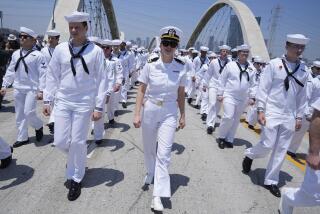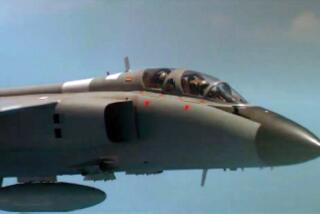U.S. Navy Pays Visit to Shanghai, Stows Politics on Board
- Share via
SHANGHAI — Earlier this century, American sailors starting shore leave in Shanghai received a helpful booklet containing “prices of rickshaws and two pages of prophylactic advice,” recalls one U.S. official.
The sailors and Marines aboard the 7th Fleet’s dock-landing ship Ft. McHenry, which docked along Shanghai’s historic Huangpu River on Wednesday, were advised to play it safe too. But the concerns these days are a bit different, as much political as practical.
This generation’s servicemen--and for the first time in China, servicewomen--were told to stay in uniform, be back on board by midnight and remember that China may be just one of dozens of countries where they stop in Asia, but it’s the one that matters.
The U.S. military plays point in a tense triangle: It tries to keep relations warm at a time when Washington pundits predict that the United States and China are heading for a new Cold War. At the same time, the U.S. must keep peace between China and what Beijing considers its prodigal province with designs on independence: Taiwan.
Pfc. Nathan Cobb, dressed in camouflage to greet Chinese visitors to the ship, said the McHenry’s sailors were indeed briefed on the prices of taxis--as well as on how to respond to queries about touchy political subjects. With blue eyes peering from streaks of green face paint, he said: “We’ve been told to just pretty much avoid the subject, ma’am.”
But although everyone from Cobb to his commanding officers denied that they would be discussing political tensions on this “friendly visit,” the ship’s call is a symbolic reminder of the United States’ oblique but imperative role in preventing conflict in the Pacific.
“The U.S. plays a key part in trying to contain Taiwan, so it is in China’s interest to try to work with the U.S.,” said Tai Ming Cheung, a Hong Kong-based specialist on the Chinese military. “But China is warning darkly that if this fails, things could get ugly.”
Beijing has reacted angrily to Taiwan’s attempts at world recognition. On Tuesday, Chinese Premier Li Peng reiterated threats to invade the island if Taiwan moves toward independence and warned foreign powers to stay out of its “internal” quarrels.
The McHenry visit is in part an attempt to rebuild U.S.-Chinese relations damaged after Washington granted Taiwanese President Lee Teng-hui permission for a “private” visit to New York in June. That trip drove the relationship to its lowest point in 16 years. Beijing cut off military and official exchanges in retaliation and didn’t resumed them until September.
As the McHenry sailed into Shanghai on a current of good cheer and ceremonial welcome Wednesday, it seemed that military relations were back on course. Chinese sailors lining the waterfront stood at attention, and a Chinese brass band answered the McHenry’s strains of John Philip Sousa with a rendition of “The Red Five-Star Flag Is Flying in the Breeze.”
Shanghainese crowded near the dock to glimpse the festooned McHenry, taller than the four-story buildings lining the riverfront. “It’s good that they’re here,” said a 21-year-old Chinese sailor. “We can learn a lot from them.”
But the stopover--only the second in Shanghai since 1949--was the result of a heavy political undertow. Beijing offered to accept the port call at the last minute to help persuade the Clinton administration to withdraw a U.S. military attache accused of spying in southern China, officials in Washington said.
In the meantime, the McHenry’s crew is behaving much better than predecessors who strolled Shanghai’s waterfront in the city’s Golden ‘20s.
Sailors emptied out of The Long Bar, a hot spot in central Shanghai, even before the special “Model Show” began so they wouldn’t miss their midnight curfew.
“I’ve been looking forward to liberty,” said one. “But we promised not to cause any international incidents.”
Times staff writer Jim Mann in Washington contributed to this report.
More to Read
Sign up for Essential California
The most important California stories and recommendations in your inbox every morning.
You may occasionally receive promotional content from the Los Angeles Times.












